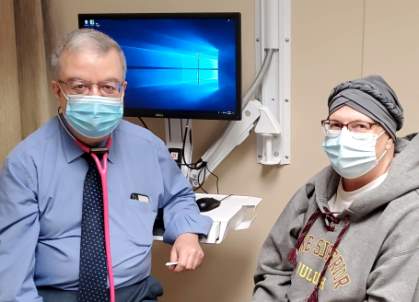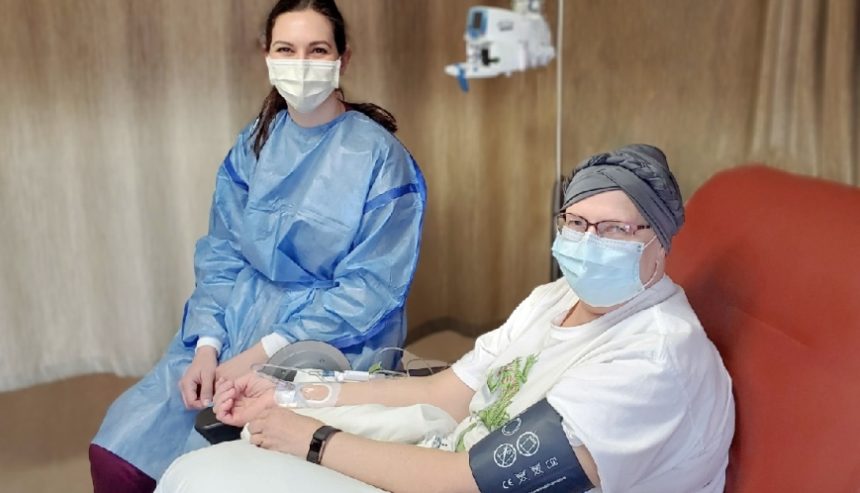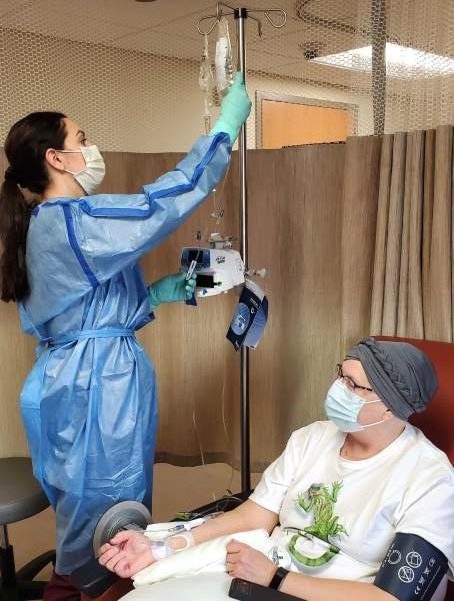Having cancer can be scary for anyone because of all the unknowns. Though at first, it may feel that the odds are stacked against you, many treatments are available to fight cancer. It starts by understanding what cancer is, where you can see an oncologist, what effective cancer care is available, and feeling assured you’ll receive the best care possible.
As we know, the most important aspect of battling cancer is detecting it early. “My breast cancer was less than a third of an inch when the radiologist identified it in my screening 3D mammogram at Glacial Ridge,” said Lynn Flesner, a current oncology patient.
As a patient with many appointments and treatments, Lynn and her husband quickly realized the convenience of having all her cancer care local. Soon after her diagnosis, Lynn had her ultrasound-guided biopsy at Glacial Ridge Hospital. From additional imaging scans and labs to seeing her oncologist and getting chemotherapy, she was able to get comprehensive cancer care in Glenwood, an hour closer to her home than St. Cloud.
 For patients’ convenience in the Glacial Ridge Health System service area, Oncologist Dr. Hani Alkhatib (Al-ca-teeb) from CentraCare’s Coborn Cancer Center travels to Glenwood one to two times a month. Receptionists and the care team have a very organized approach allowing 30-35 patients and their support person, if desired, to see Dr. Alkhatib that day without feeling rushed. The initial consult appointments are 30 minutes, whereas follow-up appointments are 15 minutes each. From the first meeting, he’ll help you understand what lies ahead and is a resource you can feel good about.
For patients’ convenience in the Glacial Ridge Health System service area, Oncologist Dr. Hani Alkhatib (Al-ca-teeb) from CentraCare’s Coborn Cancer Center travels to Glenwood one to two times a month. Receptionists and the care team have a very organized approach allowing 30-35 patients and their support person, if desired, to see Dr. Alkhatib that day without feeling rushed. The initial consult appointments are 30 minutes, whereas follow-up appointments are 15 minutes each. From the first meeting, he’ll help you understand what lies ahead and is a resource you can feel good about.
“I’m so grateful for Dr. Alkhatib’s outreach care. To see him or have tests done in St. Cloud, I’d have had to take half a day off of work,” Lynn explained. “For chemotherapy, it would have been an entire day, and when you don’t feel like doing anything after, an hour-and-a-half ride home is a long time.”
When your doctor refers you to Dr. Alkhatib, they will ensure he has access to your medical history and reports from x-rays, MRIs, CTs, or other imaging tests. In addition, if you had a biopsy or any lab tests done at Glacial Ridge Hospital or elsewhere, he would also be able to view those results.
First Appointment with an Oncologist
At your first appointment, Dr. Alkhatib will review your type of cancer and discuss treatment options available for you, their effectiveness, and their side effects. Once you and your oncologist select a treatment option, you’ll talk about the next steps.
Registered Nurse and Oncology Coordinator at Glacial Ridge Health System, Jeanette Pasche, recommends bringing someone with you to your doctor appointments. “It can feel overwhelming. Write down your questions so you don’t forget to ask when you see your doctor,” she said.
Communication is Key
A benefit of being cared for in a community hospital is that you get to know your registered nurses (RNs), and they get to know you. The caring, experienced RNs who administer cancer treatments at Glacial Ridge Hospital have specialty training in oncology. Over the next several months, they will communicate with your doctor(s), support you, and be there to answer your questions. Jeanette said patients appreciate the direct communication with her and, in turn, Dr. Alkhatib if needed. After contacting Dr. Alkhatib, Jeanette usually has an answer for the patient the same day.
Individualized Cancer Treatment
Chemotherapy is a common cancer treatment. These powerful drugs are used to stop cancer cells from growing and spreading. Chemo works throughout your body and is different than radiation or surgery, which target specific areas.
“Nowadays, many treatments are tailored precisely to individual cancers,” states Jeanette. “Your tumor may be tested to see if it has specific mutations that we can target with specialized treatments. These treatments are commonly referred to as immunotherapy,” she explains. Immunotherapy works by aiding the body’s natural defenses against cancer. It does this by either helping your immune system recognize cancer cells or by providing laboratory-created treatment that supplements your immune system so that your immune system can attack the cancer.
Together, chemotherapy and immunotherapy are called “systemic therapy” because they are carried throughout your entire system by the bloodstream. Systemic therapy will often include more than one drug to attack your cancer using several different mechanisms. This approach allows medical staff to use lower doses of each drug, reducing toxicities.
Sometimes Dr. Alkhatib orders additional tests or exams before the first treatment. Staff at Glacial Ridge Hospital work with you to schedule these at your convenience.
What to Expect at Your Chemotherapy/Immunotherapy Treatment
A nurse will escort you to a quiet area dedicated to patients who need care by chemo-trained RNs. Then, the nurse will review any lab work you may have had the day before to ensure you meet the parameters for treatment. When you are comfortably seated, the nurse will start an IV line with extra fluids to help your body manage the treatment drugs. Depending on the treatment, your doctor may have ordered medications for you to take beforehand to prevent side effects or treatment reactions. Next, you’ll receive chemo/immunotherapy through the IV.
Treatment time can vary from 30 minutes to several hours, depending on which cancer treatments your oncologist has ordered. You may want to bring things to help you relax and pass the time at these appointments, such as a good book, music, crosswords, or a smartphone. Wear comfortable clothing to your chemotherapy appointment with loose or short sleeves in case you need a secondary IV site.
Side Effects of Chemotherapy/Immunotherapy
Side effects from the treatment can depend on the type of cancer you have, your overall health, and the type of chemotherapy/immunotherapy drugs you receive. Karri Gilsdorf, an RN at Glacial Ridge Hospital with specialty training in oncology, said, “Fatigue is probably the most common side effect that cancer patients experience. It can be tough for busy people to adjust to their temporary lifestyle.” Other common side effects are nausea, hair loss, changes in taste, loss of appetite, and muscle, bone, and joint aches.
“Fortunately, things can be done to prevent or lessen a person’s side effects after chemotherapy,” said RN Mali Morken, an oncology nurse at Glacial Ridge Hospital. “There is a lot of information in the oncology binder that each person gets. We also have additional tips for relief based on what you are experiencing afterward.”
Once Lynn started chemotherapy, she felt at ease knowing that either Mali or Karri would be caring for her throughout each of her treatments. Of course, she expected the side effects that Mali had explained to her. However, she didn’t realize how much she would have to listen to her body. Her advice for others is, “Rest when you need it and stay hydrated. Even if you don’t feel like eating or drinking, you have to drink fluids to help your body’s immune system fight the cancer cells.”
You Will Need Your Support System
Almost everyone who has gone through a stressful, emotionally and physically draining experience would advise you to say yes to people who offer to help! You will be going through a lot. Aside from the words of encouragement from everyone and cancer survivors reaching out in support, Lynn shared, “I had someone who made me soup every time I had chemo. I appreciated her wanting me to have something ready to eat the next few days when I’d be feeling the worst.”
Emotions and Patience
A cancer diagnosis and treatment often cause strong emotions at various times. Lynn’s most challenging days came after her final round of chemotherapy when she was not rebounding as soon as she had after the first three. She added, “I wanted this stage to be over, so the slower recovery time was hard to accept.” Nevertheless, Lynn had to remind herself to be patient – it would happen. She would get endurance back and not be as exhausted – when her body said it was time.
Importance of Early Screenings
“I can’t stress enough how important it is to get your health screenings done when recommended,” emphasized Lynn. “The routine 3D mammogram found my cancer early, and the treatment options were simpler because of it.”



